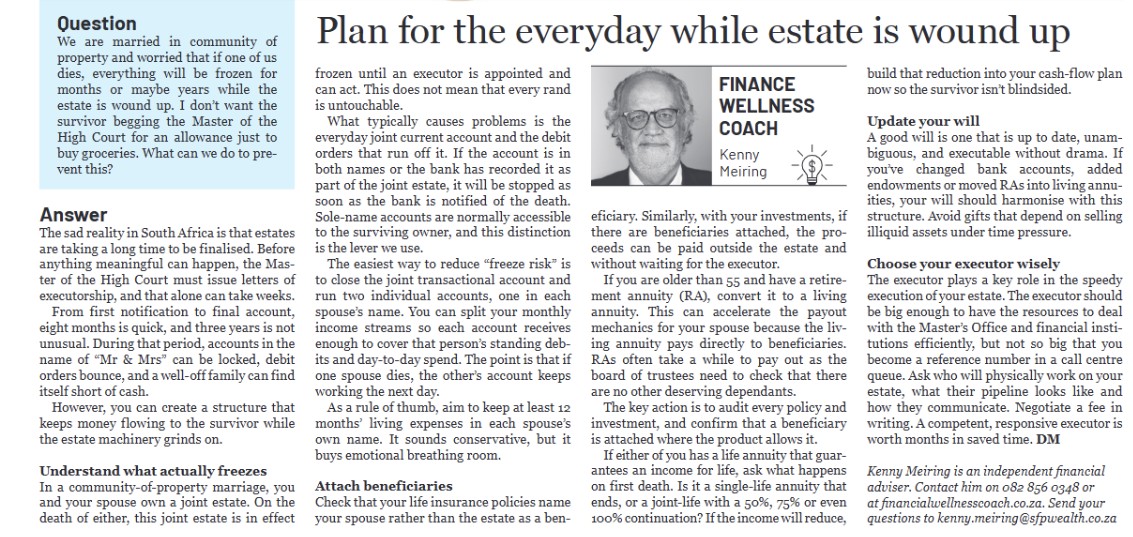No. 228 – Plan for the everyday while estate is wound up
Question
We are married in community of property and are worried that if one of us dies, everything will be frozen for months or maybe years while the estate is wound up. I don’t want the survivor begging the Master of the High Court for an allowance just to buy groceries. What can we do now to prevent this?
Answer
In South Africa, the sad reality is that estates are taking a long time to be finalised. Before anything meaningful can happen, the Master of the High Court must issue Letters of Executorship, and that step alone can take weeks. From first notification to final account, eight months is quick, and three years is not unusual. During that period, accounts in the name of “Mr & Mrs” can be locked, debit orders bounce, and a well-off family can find itself cash poor.
However, with some planning, you can create a structure that keeps money flowing to the survivor while the estate machinery grinds on.
Understand what actually freezes
In a community-of-property marriage, you and your spouse own a joint estate. On the death of either, that joint estate is effectively frozen until an executor is appointed and can act. That does not mean every rand is untouchable.
What typically causes problems is the everyday joint current account and the debit orders that run off it. If the account is in both names or the bank has recorded it as part of the joint estate, it will be stopped as soon as the bank is notified of the death. Sole-name accounts are normally accessible to the surviving owner, and that distinction is the lever we use.
The easiest way to reduce “freeze risk” is to close the joint transactional account and run two individual accounts, one in each spouse’s name. You can split your monthly income streams—salary, annuity payments, investment income—so each account receives enough to cover that person’s standing debits and day-to-day spend. You can still operate like a team; the point is that if one spouse dies, the other’s account keeps working the next day.
As a rule of thumb, aim to keep at least 12 months of living expenses in each spouse’s own name. It sounds conservative, but it buys emotional breathing room at the worst possible moment.
Attach beneficiaries
Check that your life insurance policies name your spouse rather than the estate as beneficiaries. Similarly, with your investments, if there are beneficiaries attached, the proceeds can be paid outside the estate and without waiting for the executor. Make sure you use them.
If you are over 55 and have a retirement annuity, convert your RA to a living annuity. This can accelerate the payout mechanics for your spouse because the Living Annuity pays directly to beneficiaries. RAs often take a while to pay out as the board of trustees need to check that there are no other deserving dependents.
The key action is to audit every policy and investment and confirm that a beneficiary is attached where the product allows it. Too many families discover blank nomination fields at claim stage.
If either of you has a life annuity which guarantees an income for life, ask what happens on first death. Is it a single-life annuity that ends, or a joint-life with a 50% , 75% or even 100% continuation? If the income will reduce, build that reduction into your cashflow plan now so the survivor isn’t blindsided.
Update your will
A good will is one that is up to date, unambiguous, and executable without drama. If you’ve changed bank accounts, added endowments, or moved RAs into living annuities, your will should harmonise with that structure. Avoid gifts that depend on selling illiquid assets under time pressure.
Choose your executor wisely
The executor you use plays a key role in the speedy execution of your estate. The executor should be big enough to have the resources to deal with the Master’s Office and financial institutions efficiently, but not so big that you become a reference number in a call-centre queue. Ask who will physically work on your estate, what their pipeline looks like, and how they communicate. Negotiate a sensible fee in writing. A competent, responsive executor is worth months in saved time.
You can’t shrink the Master’s queues, but you can structure your affairs to ensure that your spouse has sufficient cash to live on while your estate is finalised.
KENNY MEIRING IS AN INDEPENDENT FINANCIAL ADVISER
Contact him via phone, email or via contact phone on the financialwellnesscoach.co.za website

Read more of our articles on the Daily Maverick website or newspaper weekly!

